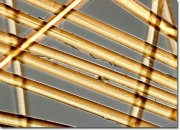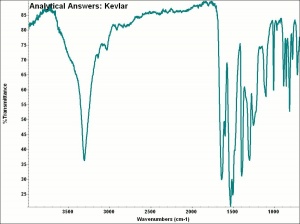Difference between revisions of "Kevlar"
(username removed) |
|||
| Line 4: | Line 4: | ||
[DuPont] A registered trademark for a para-aramid fiber (aromatic polyamides). Kevlar fibers are composed of poly(p-phenylene terephthalamide), which is made from p-phenylene diamine and terephthaloyl chloride. Kevlar was first made in 1965 by Stephanie Kwolek and Herbert Blades [DuPont] but not marketed until the 70s. It has five times the strength of a steel wire of the same diameter. Kevlar also has excellent dielectric, thermal and mechanical properties and is resistant to fire, water, and biological growth. It is not resistant, however, to acids, alkalis and bleaches. Kevlar is available as fibers, ropes, cables and fabric. It is widely used as a filler and reinforcing agent. Kevlar is used in advanced composites for aircraft and aerospace applications. The extremely high strength and impact resistance of Kevlar has led to its use in bullet proof vests. It is also used in tire cords, high pressure hoses, conveyer belts, cables, concrete reinforcement, race car bodies, sports equipment, and protective clothing. | [DuPont] A registered trademark for a para-aramid fiber (aromatic polyamides). Kevlar fibers are composed of poly(p-phenylene terephthalamide), which is made from p-phenylene diamine and terephthaloyl chloride. Kevlar was first made in 1965 by Stephanie Kwolek and Herbert Blades [DuPont] but not marketed until the 70s. It has five times the strength of a steel wire of the same diameter. Kevlar also has excellent dielectric, thermal and mechanical properties and is resistant to fire, water, and biological growth. It is not resistant, however, to acids, alkalis and bleaches. Kevlar is available as fibers, ropes, cables and fabric. It is widely used as a filler and reinforcing agent. Kevlar is used in advanced composites for aircraft and aerospace applications. The extremely high strength and impact resistance of Kevlar has led to its use in bullet proof vests. It is also used in tire cords, high pressure hoses, conveyer belts, cables, concrete reinforcement, race car bodies, sports equipment, and protective clothing. | ||
| − | See also [ | + | See also [[aramid fiber]]. |
== Synonyms and Related Terms == | == Synonyms and Related Terms == | ||
Revision as of 10:44, 21 January 2014
Description
[DuPont] A registered trademark for a para-aramid fiber (aromatic polyamides). Kevlar fibers are composed of poly(p-phenylene terephthalamide), which is made from p-phenylene diamine and terephthaloyl chloride. Kevlar was first made in 1965 by Stephanie Kwolek and Herbert Blades [DuPont] but not marketed until the 70s. It has five times the strength of a steel wire of the same diameter. Kevlar also has excellent dielectric, thermal and mechanical properties and is resistant to fire, water, and biological growth. It is not resistant, however, to acids, alkalis and bleaches. Kevlar is available as fibers, ropes, cables and fabric. It is widely used as a filler and reinforcing agent. Kevlar is used in advanced composites for aircraft and aerospace applications. The extremely high strength and impact resistance of Kevlar has led to its use in bullet proof vests. It is also used in tire cords, high pressure hoses, conveyer belts, cables, concrete reinforcement, race car bodies, sports equipment, and protective clothing.
See also Aramid fiber.
Synonyms and Related Terms
aramid; para-aramid;
Other Properties
Resistant to organic solvents. Degrades in acid, alkalis and bleaches. Tenacity = 22 g/denier; Moisture regain = ~7%; Elongation =~4%; Cross section = circular. Heat resistant to 400C without melting
| Density | 1.44 |
|---|
Additional Information
DuPont: Kevlar Website M. Joseph, Introductory Textile Science, Holt Reinhold & Winston, Fort Worth, 1986, p. 110-112.
Comparisons
Properties of Synthetic Fibers
Authority
- Rosalie Rosso King, Rosalie Rosso King, Textile Identification, Conservation, and Preservation, Noyes Publications, Park Ridge, NJ, 1985
- Marjory L. Joseph, Marjory L. Joseph, Introductory Textile Science, Holt, Rinehart and Winston, Fort Worth, TX, 1986
- Wikipedia, the free encyclopedia, at http://www.wikipedia.com Comment: http://en.wikipedia.org/wiki/Kevlar (Accessed Nov. 9, 2005)
- Richard S. Lewis, Richard S. Lewis, Hawley's Condensed Chemical Dictionary, Van Nostrand Reinhold, New York, 10th ed., 1993
- Website address 1, Website address 1 Comment: www.textileworld.com/categories/9905/fibers.html
- Website address 2 Comment: www.si.deu/lemelson/centerpieces/ilives/lexture05.html
- Meredith Montague, Meredith Montague, contributed information, 1998
- Product Information Comment: Manufacturer's literature
- Theodore J. Reinhart, Theodore J. Reinhart, 'Glossary of Terms', Engineered Plastics, ASM International, 1988
- Art and Architecture Thesaurus Online, http://www.getty.edu/research/tools/vocabulary/aat/, J. Paul Getty Trust, Los Angeles, 2000

